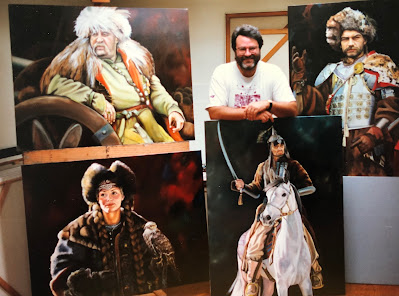On 8 July 2023 the Club was supposed to travel to Arden, Helena Modjeska Historic House and Gardens in Modjeska Canyon, Silverado area of Orange County, for a tour. Unfortunately, half of those who reserved cancelled last minute, and the other half got lost due to weird issues with GPS: you had to type in the street name and number, instead of the place name, in order to get accurate information. Those who sought just Modjeska House ended up in the middle of nowhere.
On 8 July 2023 the Modjeska Club was represented by its President and Secretary, on 7 October 2023 by five members: Malgorzata and Slawek Brzezinski, Izabella Zuralski-Yeager, Elzbieta Kanska and former member Piotr Pieczonka. The Helena Modjeska Foundation were in costume, including its President Victor Sheer in a top hat, and Pamela Harris in a lovely red and white lace and flowers ensemble. The Modjeska Shakespeare Players gave a presentation of Shakespearean characters and monologues from his plays and there was live music from the period, that sounded very "country and western" to me. There were about 150 people in attendance, coming and going through the day, and all 20 booklets with Modjeska's bio were given away. This text is the first chapter of our new history, Celebrating Modjeska in California: History of Helena Modjeska Art and Culture Club. forthcoming this December.
Below are some fragments of this text, without footnotes, about Arden, Modjeska as gardener, and Modjeska-themed organizations.
MODJESKA IN ARDEN
I have already mentioned the efforts of Modjeska and her husband Karol Chłapowski to build a profitable estate in California, based on the model of noble estates in Poland. They made home for themselves in “Arden,” an elegant mansion in the remote Santiago Canyon in Orange County. It became her refuge and a place of rest between exhausting tours around America. After the 1893 Ukaz by the Tsarist government forbidding her “to enter any part of the Russian territory,” Arden became Modjeska’s primarily home, always open to relatives and friends, for whom she did not spare hospitality.
The estate also served as a working ranch with ever changing types of commercial crops; it consistently brought income from the sale of honey. Poultry and other domestic animals were raised for personal use, but the estate was mostly supported by Modjeska’s stage earnings. After the sale in 1906, the property was subdivided, and a central portion transformed into a Country Club. It was then purchased by the Walker family who used it as a summer retreat for 60 years. In 1986, Orange County purchased the house with adjoining grounds; three years later, the Helena Modjeska Historic Home and Garden, a National Historic Landmark, one of only two in Orange County, opened its doors to the public.
A Gardener’s Boss, 1893-1895
Few Poles know that Modjeska contributed to the study of Californian native plants by employing a famous gardener, specialist in wildflowers, shrubs and their seeds, Theodore Payne. He came from England and spent his first two years in America working in Arden (1893-95) where he was responsible for ornamental gardens and commercial projects, such as the honey production. Simultaneously, Payne became interested in native plants and began collecting their seeds. While the lady of the house was on theater tours, Payne had time to study nature and hike the countryside. He rode horses and collected samples of local plants. After moving on from this job, he became the owner of a seed company and nursery school in Los Angeles. In 1960, Payne retired and founded the Theodore Payne Foundation for Wild Flowers and Native Plants in Sun Valley, California. His 1964 book, Life on the Modjeska Ranch in the Gay Nineties, documents the adventures and misfortunes of ranch life and Modjeska’s gardens.
A Botanist and Illustrator
Modjeska knew how to draw and liked to draw. On the margins of play texts one can find many sketches, caricatures or portraits of actors. In 1896, she wrote a fairy tale for her grandson Felix Modjeski, and illustrated it herself with watercolors of fantastic leaves and flowers. While enjoying the country life in the Arden house and gardens, she was passionate about drawing plants from nature, as seen in the tale’s illustrations of the Opuntia cactus, King Palm fronds or dry flowers of wild buckwheat. Going further, we could even call Madame Modjeska a Rosarian, since she loved and cared for many varieties of the rose bush. According to Payne, her garden contained many varieties of antique roses, selected and tended by the actress: Papa Gontier, Catherine Mermet, Madame Caroline Testout, Marie Van Houtte, Maman Cochet, Payl Neyron, Magna Carta, Ulrich Brunner, Prince Camille de Rohan, General Jacqueminot, Captain Christy, American Beauty, Reve d’Lamarque, Beauty Glazenwood, Reine Marie Henrietta, and White Bank.
Celebrating Modjeska in California
Collections of documents relating to Modjeska’s career in Poland and the United States are housed in the special archives of the University of California, Irvine, featuring the actress’s theatrical memorabilia and archives donated by Ellen K. Lee who collected Modjeska-themed items from 1965 to 2006. The Bowers Museum in Santa Ana has some of her costumes and artwork from her home. The Huntington Library in San Marino, CA in the Opid-Modjeska Family Papers holds correspondence, photographs, and ephemera from 1869-1982 of Modjeska and members of the family of Ludwik Opid (1865-1948), her nephew. The New York Public Library for the Performing Arts holds Madame Modjeska Scrapbooks; 1877–1898.
There are many Modjeska-named sites – a Peak, Canyon, Park, Waterfall… The Modjeska Peak, at 5,499 feet, is the lower peak in Saddleback Mountains overlooking the Modjeska Canyon; the Santiago Peak is the higher one. The Modjeska Park in Anaheim, opened in 1963 holds a variety of sports facilities (football/soccer field, basketball courts, softball fields, recreation center, children play areas, etc.) on a beautiful 23.5-acre property. A smaller Modjeska Park is across the street from the Modjeska Historic House and Gardens. A two-mile road through an unincorporated, rustic area of Orange County, the Modjeska Canyon winds through the center of what once was the Modjeska Ranch of 200 acres, subdivided in 1986. In the Modjeska Falls, also known as Upper Glen Alpine Falls in El Dorado County, California, the Glen Alpine Creek drops a total of 51 feet in three steps (30 feet plus two smaller drops of 10 feet each); the falls are seasonal, fed by melting snow.
“Arden” – Modjeska Historic House and Gardens is one of only two National Historic Landmarks in Orange County, California. Initially built by the Pleasants’ family and remodeled for Modjeska by architect Stanford White, it was sold in 1906, when Helena and Karol Chlapowski moved to a smaller house on Bay Island in Newport Beach. After being used as a Country Club until 1935, the property served as the Walker family vacation home for sixty years. The site was first recognized in 1935 as a California Historic Landmark No. 205. Then in 1974, it was added to the Federal database as the first National Historic Landmark of Orange County. In 1986, Orange County purchased the house with 14 acres around it; after three years of renovations, in 1989 the County established the Historic House and Gardens, open to the public, albeit with restricted access due to traffic and parking conditions in the Modjeska Canyon.
The Modjeska Club wrote several letters to Orange County in support of its plan to establish a park and museum after the property purchase in 1986. Meanwhile, the issue of naming and marketing the Helena Modjeska Historic House and Gardens was repeatedly raised by a San-Diego-based organization, the Modjeskis’ Society, represented by Acting Director Wacław Czajkowski who issued “Press Release: A Summary of Stanford White by Modjeskis’ Society” undated, probably in November 1995. This curious typewritten page outlined the history of the site and its recognition and voiced a disapproval of including the name of architect Stanford White in their descriptions. The Modjeskis’ Society insisted on deleting White’s association with the property from all landmark documents. Wacław Czajkowski wrote copious letters to various newspapers and organizations, demanding the restoration of a full-size 200-acre ranch, criticizing the creation of the Helena Modjeska Foundation in 1991, and bemoaning the fact that the government did not pay back the Society’s expenses. Unfortunately, some of this correspond-dence was published, as if it represented the community’s voice.
Californian Organizations with “Modjeska” in their Names
In the 20th and 21st century the following cultural organizations took the name of Helena Modjeska in California. These organizations are discussed further in appropriate chapters of this book.
• The Helena Modjeska Commemoration Committee established in 1949 by an attorney Joseph Scott as Chair, with Leonidas Dudarew-Ossetyński serving on its Executive Committee.
• The Helena Modjeska Memorial Committee initiated in July 1954 by Leonidas Dudarew-Ossetyński and prominent Polish Americans in California to garner support for the construction of a Modjeska Monument designed by Stanisław Szukalski (see below).
• The Modjeska Players theater group organized by Leonidas Dudarew-Ossetyński in Los Angeles in 1954 and in operation to 1958, with Lidia Próchnicka as his co-star in several hundred performances during three years of tours in the U.S. and Canada.
• The Helena Modjeska Art & Culture Club in Los Angeles, envisioned in 1971 by Leonidas Dudarew-Ossetyński and his friends, formally established in 1972 as an affiliate of American Council of Polish Cultural Clubs and Polish American Congress, Southern California Division; taken over by Solidarity-era immigrants in early 1980s, transformed first into an exclusive, private social club and then into a tax-exempt, nonprofit corporation (2005, see Chapter 4 – its genesis; Chapter 7 – changed status).
• The Helena (or Helen) Modjeska (or Modrzejewska) Polish-American Theatre, Group, Inc. created in December 1982 by Hanna Tyszkiewicz, Henryk Rozpędowski, and others, to promote Polish theater and thus honor the memory of the great actress; in operation in 1983-1999, performing in Polish.
• The Modjeskis’ Society for the Preservation of Cultures established in April 1986 by Wacław Czajkowski in San Diego with the purpose of creating a permanent monument to Modjeska and Henryk Sienkiewicz on the “Modjeska Ranch” of 200 acres; this group generated press coverage of its protests of subdividing the Ranch and selling off individual lots to future residents. The Modjeskis’ Society opposed the establishment of the 14-acre Helena Modjeska Historic House and Gardens, and state and federal Historic Landmarks. Its charitable status was revoked in 2004.
• The Helena Modjeska Foundation, a nonprofit organization incorporated in Orange County in 1991 by Ellen K. Lee with support of notable Americans (Pamela Harrell) and Polonia activists (Linda Płochocki), to provide volunteers and financial support for the Helena Modjeska Historic House and Gardens; www.helenamodjeska.net.
• The Helena Modrzejewska Polish School of Orange County – operating at the Polish Center in Yorba Linda and offering Polish language, history, and culture classes to K-8 students on Saturdays, established in 1986 by Jerzy and Alicja Czarnecki; incorporated as a nonprofit organization in 2004; www.szkolapolska-oc.org.
• The Modjeska Playhouse, established in 2007 in Orange County by three actors-directors without links to Polish community (Joe Alanes, Joshua Stecker and Christopher Sullivan) to “commemorate Helena Modjeska and her Orange County roots by enriching the local community in Saddleback Valley with more cultural experiences.”
• The Helena Modjeska Society established by Kris Cieply, that produced performances of Ewa Boryczko’s play, and commissioned replicas of Modjeska stage costumes and portraits.
It is a testament to her wide-spread influence that so many organizations in Southern California have chosen Helena Modjeska as their patron. In addition to the Modjeska Memorial Committee of Szukalski and the Modjeska Players, there were two other theater groups honoring the famous actress in their names: the Helena Modjeska Polish-American Theater Group in Los Angeles, founded in 1982 and the Modjeska Playhouse operating in Orange County since 2007 and staging theater performances.











































